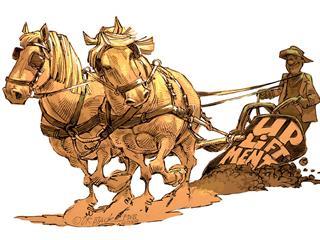
Many agricultural economists believe that the world, including its agricultural sector, is moving from structural to fundamental change.
This will reshape value chains, business models, governments and employment, and affect the way we live and relate to one another.
As it is, farmers everywhere have already begun experiencing significant changes in markets, demand, food security, climate and technology.
Changing markets
Since about 2010, agricultural markets appear to have seen a reversal of trade liberalisation and openness. Adding to the uncertainty surrounding this trend are issues such as Brexit.
Here in South Africa, we don’t know what will happen with the SA/US AGOA agreement.
Will we see more protectionism in global agricultural trade? No-one knows, but time will tell.
Changing demand
A major topic worldwide has been population growth and how this will drive food demand. While previous projections assumed that the planet’s population would keep growing, it is
now expected to reach 11 billion by 2100 and stabilise.
Growing demand for agricultural products is also being driven by increasing personal incomes. Having more money results in a greater demand for food as well as a more varied diet.
Changing food security
Recent years have seen food security scares in certain parts of the world. These have largely been due to increasing food prices, with local populations protesting that food is becoming unaffordable. We have seen protests even here in South Africa.
Such protests could increase globally if issues of food security and affordability are not urgently and adequately addressed.
Changing climate
We are seeing more climate change-related natural disasters such as storms, floods, droughts and wildfires. The Western Cape, for example, is still in the grip of a crippling drought and has experienced major runaway fires as a result.
Changing technology
There are already a number of ‘disruptive technologies’ that are leading to what has been termed the ‘fourth industrial revolution’. These include the Internet, 3D printing, advanced robotics, driverless tractors, new manufacturing materials, and genetic advancements.
Bioengineering has already created the first laboratory-manufactured hamburger patties. Could fruit and vegetables be next? In Japan, a fully automated, energy- and the water-efficient facility will soon produce 30 000 head of lettuce daily.
New technology is also one of the reasons agricultural employment around the world, and particularly in developed countries, is declining steadily. In South Africa, we are also experiencing this trend.
The ongoing evolution of agri economics
What sets the fundamental change embodied in these examples apart from previous changes is, firstly, its sheer size; it has the potential for unprecedented shifts in the world
economy.
Secondly is its speed; the velocity of the change is exponential rather than linear. Thirdly is its scope; entire systems will be transformed across countries, companies and industries.
Given all this, it is clear that agricultural economics and the economic theory that underpins it need to continue evolving. We are already seeing this in some areas, such as the proliferation of new analytical techniques and mathematical models.
Agricultural economics has in fact had a long history of adaptation. When the discipline was formally established in the US in the early 1900s, its key focus was on the macro-economic aspects of agriculture. This quickly shifted to farm management.
Shortly thereafter, the focus changed to international trade, resources, rural development and policy. As a result, agricultural economics now covers a far greater area than before.
The discipline has played a pioneering role in the application of mathematical models in economics, starting with enterprise budgets and farm experiments. In the 1950s and 1960s, new computing power led to optimisation tools such as linear programming.
Then came agricultural marketing studies to model supply and demand, the estimation of production functions to maximise profits, and estimating relationships between production and marketing. Most agricultural economics journals today have a strong focus on modelling.
The major change trends in global agriculture already mentioned combined with the development and use of disruptive technologies leads to two questions: how will these affect the way in which agricultural economics is practised, and how can agricultural economists prepare for these changes?
For one, they have an important role to play in assessing which disruptive technologies will enhance productivity in the sector.
Big data presents opportunities for research that were simply not possible before, and agricultural economists will be under pressure to collect and disseminate more and more information. Fortunately, new tools will enable more meaningful data to be collected at a much faster pace than before.
While new technologies will certainly affect production, environmental pressures will continue in the face of climate change.
Agricultural economists can no longer work in isolation; they need to integrate environmental and resource economics to achieve sustainable agricultural development. For example, economic models will need to include climate change as a variable.
Research on new agricultural value chains and business models will require ‘out-of-the-box’ approaches that venture away from more conventional analysis.
In short, taking a multi-disciplinary approach is key to the future of agricultural economics.
The views expressed in our weekly opinion piece do not necessarily reflect those of Farmer’s Weekly.
For more information, phone Bongiswa Matoti on 021 808 5213, or email him at [email protected].
Adapted from a presentation given at the AEASA 55th Annual Conference held recently in Durban, KwaZulu-Natal. Visit aeasa.org.za.











